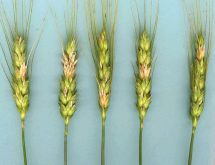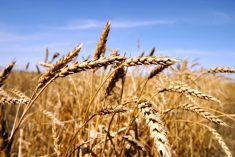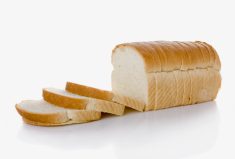Drainage maintenance still allowed
In response to the article “Licence exemption for minor drainage works removed,” which appeared in the Oct. 30 edition of the Manitoba Co-operator, Keystone Agricultural Producers would like to assure its members that we are working in co-operation with officials from Manitoba Water Stewardship to bring forward the concerns of producers.
KAP has received calls regarding licensing of water control works (drainage). There is a concern that farmers will not be able to maintain existing drains unless they are licensed. Previously, shallow scraper work, V-ditching and the filling of low areas up to 12 inches deep were exempt for existing drains. The exemption was lifted as a result of the Manitoba Ombudsman report recommending that Water Stewardship require licensing of all drains. Some farmers received notices stating that failure to comply may result in enforcement action including closure/ restoration of drains and/or fines.
Read Also

June’s fast-moving grain markets
Summing up the grain markets: June 2025 was an interesting month for canola prices and geopolitics stole the spotlight from grain market specifics
On Oct. 2, KAP met with the deputy minister of Water Stewardship, Don Norquay, and we were informed the department will not require licences for minor works immediately, and that they are committed to work with KAP to find a proper phase-in period. Currently, there is no deadline on enforcement action by the department. Water Stewardship has assured us that it is “fully committed to working with KAP to develop and implement a practical, expedient, and fair minor water control works licensing process that will better ensure landowners are protected from the adverse effects of illegal drainage.”
We will continue to work on behalf of producers to bring our message to Water Stewardship. Ian Wishart, President Keystone Agricultural Producers
Minor drainage still allowed
The provincial Department of Water Stewardship wishes to correct any misunderstandings or concerns that arose as a result of a recent mailing about minor drainage works.
The department has a long-standing practice of allowing the construction and maintenance of certain minor water control works, such as shallow scraper work, V-ditching, excavation of up to 12 inches of topsoil and the filling of low areas of up to 12 inches deep, without requiring a licence under The Water Rights Act.
The Manitoba Ombudsman’s Office, in its April 2008 Report on the Licensing and Enforcement Practices of Manitoba Water Stewardship, questioned the legal authority for this practice. The ombudsman also found that, while well intentioned, this practice undermined the department’s ability to properly enforce the water control licensing system.
Based on the ombudsman’s report, the department determined that it was obligated to establish a licensing process for minor water control works. However, the department mistakenly sent a notice to a number of rural municipalities that indicated licences for such minor works would be required immediately.
Some municipalities, in an effort to keep the public informed, then went on to widely distribute this notice. In fact, a workable minor works licensing process has not been finalized, and as such Water Stewardship regrets and apologizes for any concern or confusion this miscommunication has created.
Manitoba producers can be assured that Water Stewardship is fully committed to working with KAP to develop and implement a practical, expedient, and fair minor water control works licensing process that will better ensure landowners are protected from the adverse effects of illegal drainage.
While this process is being developed I would like to emphasize that routine minor work for which drainage licences have not been required in the past will continue to be allowed.
Don Norquay Deputy Minister
Water Stewardship
CWB puts farm further ahead
Over the past two years, I have witnessed with great dismay the unlawful lobby by the present federal government and its unseemly tactics to destroy the Canadian Wheat Board. The government’s tactics include:
Firing Adrian Measner without cause;
Imposing a gag order on the CWB before the last bizarre and biased referendum on barley marketing; and
Replacing competent CWB directors with appointed directors whose only objective appears to be the dismantling of our farmer-controlled agency that markets Canadian grain and upholds our high-quality grain standards.
The CWB is a pooled marketing agency for farmers. It was created as a result of farmers’ efforts. Its role is to support farmers in a global environment that is overwhelmingly controlled by corporate interest. I am often amazed at the number of farmers who mistakenly view their own marketing agency as the enemy, and the shareholder-driven companies (ADM, Cargill, etc…) as their allies.
If the CWB is dismantled, our only marketing “choice” will be to sell to one of several companies whose allegiance is to their own bottom line, not to farmers. They are concerned with making a large profit margin for their shareholders, not with providing a fair price at the farm gate for farmers and their families.
When I do the math, our farm is further ahead financially because of the CWB. I have a strong desire to protect our marketing agency.
Lori Erhardt National Farmers Union Big Dog Seeds Inc.
Oxbow, Sask.
Allow Siemens his say
“Freedom” is a word that is used a lot regarding Canadian Wheat Board discussions. Usually, it is in the context of marketing choice for farmers. But it now appears there is an even more fundamental freedom at stake: freedom of the press.
Harry Siemens, well-known Manitoba farm journalist, is being shut out of CWB news conferences. At first, the CWB said Siemens wasn’t accredited. When he produced his press credentials, they switched their excuses and bluntly told Siemens that the CWB reserved the right to pick and choose which reporters it would allow at its news conferences.
The CWB has decided to censor the news that farmers receive regarding the CWB.
What this incident highlights is the degree to which the wheat board and its board of directors have lost their way. The CWB is supposed to represent the views and interests of all grain producers. That means it has a responsibility to deliver fair, clear and unbiased information to farmers. That information is delivered by our respected and reliable farm media. The CWB does not have the right to hand pick who delivers the news presumably so CWB staff can have a hand in its delivery.
The CWB has become a self-interested entity, not interested in what is best for farmers. And farmers, by the way, are the ones who pay the salaries of the people working at the CWB.
To try to shut out media is unfair for farmers and, ultimately, it is counter-productive for the board itself. Times are changing in Canadian agriculture and the CWB will have to adapt or become irrelevant. The wheat board owes it to itself, as well as to farmers, to respect the voices of all media, not just the voices it likes.
This is a democracy; we don’t censor our news media.
Kevin Archibald, Market Choice Alliance
Killarney, Manitoba
Please forward letters to Manitoba Co-operator, 1666 Dublin Ave., Winnipeg, R3H 0H1 or Fax: 204-954-1422 or e-mail: [email protected](subject: To the editor)


















